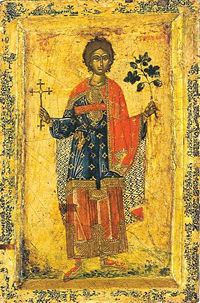Tryphon of Campsada
| Saint Tryphon | |
|---|---|

Serbian Orthodox icon of St. Tryphon of Campsada.
|
|
| Great martyr, Holy unmercenary | |
| Born | Kampsade, Phrygia |
| Died | 250 AD Nicaea |
| Venerated in | Roman Catholic Church; Eastern Orthodox Church |
| Feast | 1 February [O.S. 14 February] in Roman Catholic and Eastern Orthodox calendars 10 November (formerly in the Roman Catholic Church); |
| Attributes | falcon |
| Patronage | gardeners and winegrowers; Kotor, Montenegro; Moscow, Russia; invoked against rodents and locusts |
Saint Tryphon (also spelled Trypho, Trifon or Triphon, and known as Tryphon of Campsada) was a 3rd century Christian saint. He is venerated by the Roman Catholic and Eastern Orthodox churches as a great martyr and holy unmercenary.
Saint Tryphon was formerly celebrated jointly with Saints Respicius and Nympha on 10 November in the liturgical calendar of the Latin Church from the eleventh century until the twentieth. Saint Tryphon continues to be celebrated (separately) on 1 February [O.S. 14 February] on both the Orthodox liturgical calendar and the Roman Calendar of Saints.
Saint Tryphon is said to have been born at Kampsade (Campsada, in Phrygia, now Turkey, and as a boy took care of geese. His name is derived from the Greek τρυφη (tryphe) meaning "softness, delicacy". He acquired fame as a healer, especially of animals, and is considered one of the Holy Unmercenaries, particularly invoked on farms.
During the Decian persecution he was taken to Nicaea about the year 250 and was tortured in a horrible manner. He was beheaded with a sword after he had converted the prefect Licius. Fabulous stories are interwoven with his hagiography.
...
Wikipedia
